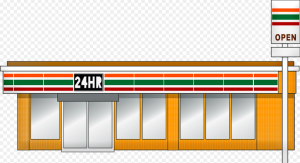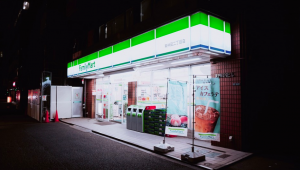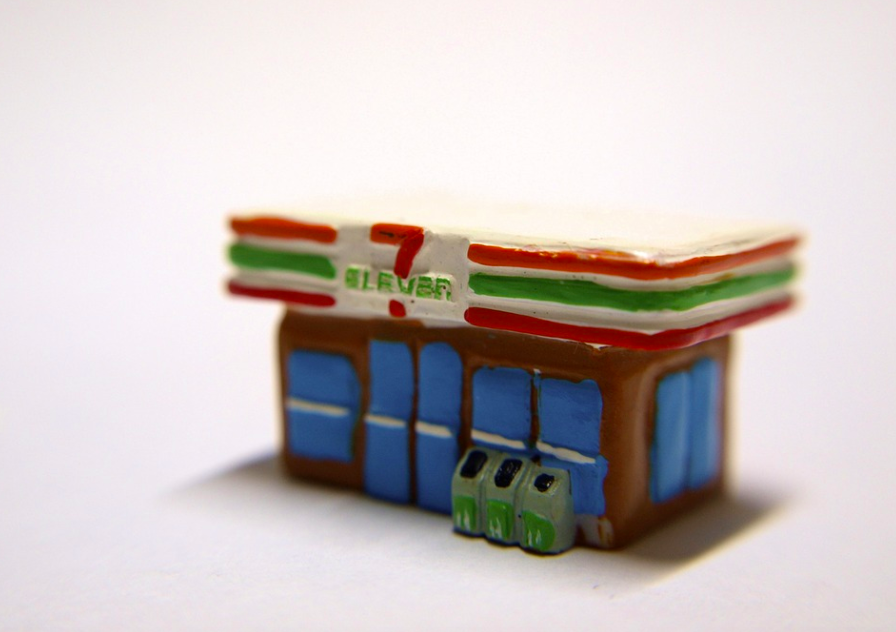7-Eleven operates, franchises, and licenses over 84,000 stores globally across 19 countries. 7-Eleven is broadly recognized as the premier destination for snacks, drinks, quick meals, and of course Slurpees.
How much will it cost to open a 7-Eleven franchise? Expect to invest between $140,250 – $1,384,000 to get into business, depending on the location. You’ll also need liquid capital between $50,000 – $250,000 and a net worth of $150,000 minimum. Take our franchise quiz to find out if 7-Eleven is the best choice based on your interests and budget.
If you’re looking for your break into the convenience store market, I’ve conducted a deep analysis of the business below and outlined all the specific fees to get started below. Don’t invest in a 7-Eleven franchise before reading my complete franchise report.
Page Contents
Financial Requirements and Fees
Here is a table of the brief financial requirements to start a franchise with 7-Eleven. Note that these numbers are solely base financial requirements and added fees and costs may be likely.
| Fees/ Expenses | Financial Amount |
| Liquid Capital | $50,000 – $250,000 |
| Net Worth | $150,000 |
| Total Investment | $140,250 – $1,384,000 |
| Franchise Fee | $0 – $1,000,000 |
Here is a further breakdown of the costs for starting a franchise with 7-Eleven
| Name of Fee | Low | High |
| Initial Franchise Fee | $0 | $1,000,000 |
| Training Expenses | $0 | $9,000 |
| Down Payment for Opening Inventory | $20,000 | $20,000 |
| Additional Opening Inventory | $15,100 | $44,500 |
| Cash Register Fund | $500 | $1,500 |
| Store Supplies | $250 | $2,500 |
| Licenses and Permits | $8,000 | $10,000 |
| Real Estate and Equipment | Covered in “7-Eleven Charge” | |
| Insurance | $1,500 | $7,500 |
| Grand Opening Fee | $8,000 | $8,000 |
| Goodwill | Only applicable to incoming franchisees buying a current franchisee’s interest in a franchise. | |
| Additional Funds During First 3 Months | $0 | $60,000 |
| ESTIMATED TOTAL | $1,163,000 | |
Here is a table detailing the other types of fees you’d run into in order to manage a 7-Eleven franchise.
| Type of Fee | Amount |
| 7-Eleven Charge | Variable percentage of Gross Profit. |
| Advertising Fee | The Advertising Fee is 1% of the Gross Profit of the store for the current month. |
| Renewal Fee | $50,000 |
| Audits | Varies. |
| Interest Expense | Varies depending on the amount financed by franchisor. The annual percentage rate is currently 7.5% |
| Indemnification | Varies, depending on loss. |
| Foodservice Operations | Varies, depending on cure costs. |
| Maintenance | Varies, according to particular store and equipment. |
| Premiums | Varies, depending on premium received. |
| Initial Training | Varies. |
| Outgoing Training | Varies, depending on type of training offered and location. |
| Inspection and Testing | Cost of inspection, if applicable, and cost of test. |
| Early Termination Fee | $5,000 |
| Service Fees | Varies, depending on service provided. |
| Mystery Shop Fees | $6.50-$13 per shop. |
| Payroll Processing | $133 per month, plus fees for any additional services the franchisee requests. |
| Close Out Fee | $200 |
| Management Fee | Not to exceed 5% of Gross Profit, plus out-of-pocket expenses. |
Average Sales / Revenue per Year
7-Eleven has a revenue of $30.15 billion in the U.S. as of 2022. As for their global revenue, Franchise Times reports $93.5 billion for 2022.
7-Eleven Franchise Facts
| Total Units | 84,061 |
| Incorporated Name: | Seven & I Holdings |
| Franchising since: | 1946 |
| Industry | Quick Food Services |
| Subsector: | Restaurants |
7-Eleven is a Japanese chain of convenience stores that was founded back in 1927 as an icehouse storefront in Dallas, Texas named Tote’m Stores. In 1945, they changed their name to 7-Eleven and started franchising.
In 1991, Japanese affiliate Ito-Yokado acquired approximately 70% of the company, they reorganized it into a subsidiary of Seven-Eleven Japan Co. in 2005 and it’s now held by the Tokyo-based Seven & I Holdings. However, they still hold their headquarters in Dallas.
How Much Profit Does 7-Eleven Actually Make?
Is owning a 7-Eleven profitable? In terms of profit, 7-Eleven franchise owners can average $50,000 – $75,000 for their salary. There are some reasons why some 7-Eleven franchises perform better than others that I’ll explain below.
Location
The location has always been an indicator of how well a franchise can perform. Being at a prime location means there has to be a good amount of traffic that flows through with minimal or no competition nearby. Ease of access to the facility is important, as well as parking spaces since customers need to be able to walk inside in order to purchase products.
Franchise Review: How Much Does It Really Cost to Start a Kona Ice Franchise?
Japan’s 7-Elevens perform extremely well because they are located on roads that have lots of foot traffic, making it convenient for people who need something fast especially on the way to work or during breaks. It helps that in Japan, most people take public transportation or they would walk to their destinations, which is a bonus for 7-Elevens since it’ll be easier to attract consumers. Depending on where you want to open, there may be a different location or storefront type that works best for that area.
Products
The products that 7-Eleven stock and sell are a big factor as to why consumers would support their business. Though 7-Eleven will require certain brands for franchises to have, they do their own research for other products for franchise owners. However, this doesn’t mean that those are still the best choices to have in stock. There are other alternatives that they could have that customers may have more of a preference.
Having fresh food, food that’s easily microwaveable, or food that can be eaten right away are must-haves for 7-Eleven. This would be the definition of a convenience store since it will be easy for customers to consume their food.

Convenience store mockup.
However, it shouldn’t be focused on snacks like chips, cookies, or biscuits like they are in America. They have been slowly adopting heated items like hot dogs, churros, and tacos.
However, it’s still not enough to attract attention especially since Americans love fast food and 7-Eleven is in competition with lots of brands like McDonald’s, Taco Bell, Subway, etc. It is important to note that 7-Eleven does change up its products depending on location to help fit the customer preferences.
Not Sure What Franchise to Start? Take Our 7-Minute Franchise Business Quiz!
Advantages
One of the advantages 7-Eleven has is that not only can they build new stores for their franchises, but they can also convert existing convenience stores too. Here are the types of existing stores that can be converted into 7-Elevens:
- Convenience stores
- Gas stations
- Service bay stations
- Liquor stores
- Small convenience stores
A key element that’s different for the 7-Eleven franchises is 7-Eleven shares its gross profits with franchisees. This means that the royalty fee owners normally pay is tied with profitable sales, rather than net-profit of sales. This does provide an advantage since the overall profit ends up as the franchise owner’s pocket.
7-Eleven also has great incentives for new potential owners who want to start a new franchise. For instance, 7-Eleven is one of the few, if not the only big brand that offers financial assistance. Their internal financing program can offer up to 65% assistance for the initial franchise fee. They will also offer additional financial assistance for those who qualify. This is incredibly rare since most company brands that have franchise programs only offer third-party options. I believe this signals belief in the concept from the 7-Eleven corporate level that you won’t find in other franchise opportunities.
Related Reading: How Much Does It Really Cost (w/ Fees) to Open a KFC Franchise?
Furthermore, 7-Eleven covers the costs for the building of the franchise store and the taxes from renting the unit and real estate. They also cover the expenses for equipment and utilities as well. This means franchise owners can focus more on the training and store operations.
In addition, 7-Eleven provides lots of business management support and resources, such as payroll systems and assistance, bookkeeping, marketing, in-store help, and other services that owners need to run a modern convenience store.
Finally, 7-Eleven has massive brand recognition. The franchise has the most market share of any convenience store and a market cap of $38.83 billion. 7-Eleven also plans to increase their stores from 19 countries to 30 by 2030.
Main Advantages
- Variety of options for 7-Eleven units and ability to convert, not just build from scratch
- 7-Eleven covers a lot of the finances for running and setting up the franchise.
- Financial assistance provided for those who qualify.
- Top performing convenience store brand.
Challenges
Every franchise comes with some challenges. For 7-Eleven, one of those difficulties is that your franchise needs to stay open 24 hours a day, 7 days a week, at least in the areas where they allow stores to be running. This means franchise owners need employees that are able to operate late at night and early morning for a 7-Eleven store.
Finding employees in general to work the normal hours is sometimes hard, but the graveyard shift can be even more difficult in the current employment environment. There’s also the risk of dangerous activities that tend to happen more often late at night such as robbery or people being drunk or disruptive.

Convenience store at night.
7-Eleven functions with the operator model with their franchisers, where they take in almost around 50% of the revenue that’s generated. Occasionally, franchises are rewarded if they have really good performance with high sales and the royalty fee may be reduced.
However, with 7-Eleven, the more you take, you have to pay more back to 7-Eleven. This really impacts franchise owner’s profit margins, which may result in them barely breaking even or perhaps even end up losing money at the end of the year.
With 7-Eleven, instead of your usual franchisor and franchisee relationship, it can be more of an employer and employee relationship since owners have less control over how they can manage their store. Since 7-Eleven pays for the supplies, utilities, and other necessities, franchises don’t get to have the freedom to choose the products they sell.
If you’re someone that likes to test selling new snacks or exploring new processes this is not the model for you. An independent store is a better option for more creative business owners.
Main Challenges
- Franchise model means owners need to pay more to 7-Eleven if they make more money
- 24/7 business hours create difficulties in trying to get good employees and risky work conditions.
- Less control of how to run your franchise
Is the 7-Eleven Franchise Right For You?
The 7-Eleven franchise may not be the right choice for some business entrepreneurs. Here are some thoughts for you to think over before you move ahead with your decision.
Not every store that wants to become part of the 7-Eleven franchise is eligible. Here’s a list of the requirements for existing stores:
- Your store needs to have been operating for at least one year operation at your location
- Your store licenses need to be in good standing and have no recent violations.
- If you’re leasing your store, you would need at least 10 years on the lease and an estoppel certificate signed by the landlord
- You will need to have records of your verifiable sales and income history for them to review.
- 7-Eleven prefers your store selling space to be at least 1800 square feet after the store is converted, but they will still consider stores that are at least 1400 square feet
- They also need at least 600 amp and 3 service areas.
- Your store needs to be able to operate 24/7 if the county or location permits.
- If you’re a gas station, they prefer to have the 7-Eleven signage and stripe pattern decoration on the store.
7-Eleven does do local research for what kind of snacks and products are popular and will request franchises to stock in those, but they will also have preferred products to stock as well such as Slurpee, Big Gulp, and other beverages or snacks that are exclusive to 7-Eleven. This means that they’ve done the work for you to figure out what are the best products to have in stock so that you’ll be able to make consistent sales.
However, this means you don’t have the freedom to decide on what products you can stock up on.
If you’re a veteran and you’re deciding to sign up with 7-Eleven’s franchise program, you’re in for a treat. They offer incentives for veterans such as special financing support of up to 65% and you’re eligible for up to a 20% discount for the initial franchise fee. They also provide extensive training and support for those who need it and there’s the ease of entry into the franchise program for veterans.
Franchise Review: How Much Does It Actually Cost to Open a Tropical Smoothie Cafe?
You have to be prepared with paying some hefty fees to 7-Eleven in order to sustain the partnership with the franchise. You’ll need to make a good profit margin in order to have a decent salary to take home. You’ll also need to be prepared to be a part of an employer/employee relationship with 7-Eleven, not a franchisor/franchisee, so you won’t have too much freedom in terms of managing your store.
That said, much of the finances and management of running the franchise will be taken care of by 7-Eleven, such as supplies, equipment, and utilities. They’ll do the research for the types of different products you need to have in stock for the best sales performance and what’s popular in the community. That’s less work for you and perhaps more profit for you.
While it may take some consideration, if you feel like the 7-Eleven franchise is right for you, you may be on your way to operating your own 7-Eleven. Click here to learn more about franchising your own store at the companies official franchisee website.





